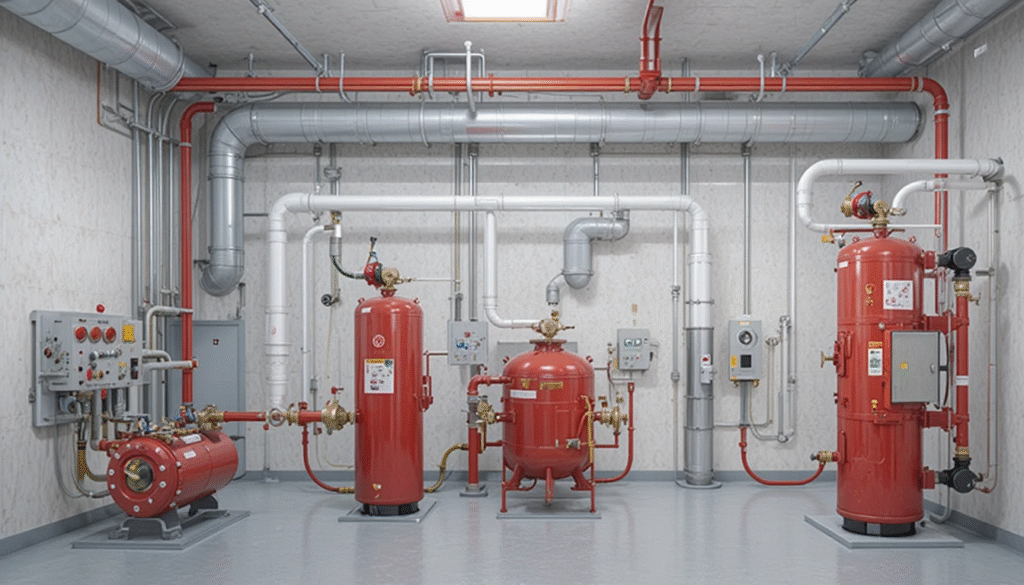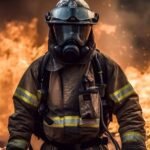
Fire safety is a crucial part of building design and maintenance in Dubai. As the city continues to grow with modern skyscrapers, malls, and industrial facilities, fire suppression systems have become essential. A properly installed fire suppression system can detect, control, and extinguish fires before they spread. It protects lives, property, and critical infrastructure, making installation a vital step in any construction or renovation project.
What Is a Fire Suppression System?
A fire suppression system is a safety mechanism designed to control or extinguish fires automatically or manually. Unlike basic fire alarms that only alert occupants, suppression systems actively release agents that eliminate flames and reduce heat.
How the System Works
Fire suppression systems detect fires using sensors or heat detectors. Once a fire is identified, the system releases a suppression agent—such as water, gas, or foam—to control the fire. These systems can operate independently or as part of a larger fire protection network.
Key Components
A typical fire suppression system includes detectors, control panels, cylinders or tanks containing suppression agents, and discharge nozzles. Each component works together to ensure rapid response during an emergency.
Importance of Fire Suppression System Installation in Dubai
Dubai enforces strict fire safety regulations under the Dubai Civil Defence (DCD). Installing a fire suppression system is not just a legal requirement but also a necessary precaution for protecting people and property.
Compliance with Local Safety Codes
All buildings, whether residential, commercial, or industrial, must comply with the DCD Fire and Life Safety Code. This includes the installation and maintenance of certified fire suppression systems that meet international standards such as NFPA (National Fire Protection Association) and FM Global guidelines.
Protection for High-Risk Environments
Many facilities in Dubai handle valuable equipment, flammable materials, or sensitive data. Fire suppression systems provide effective protection for data centers, kitchens, warehouses, and manufacturing plants, where traditional firefighting methods might not be suitable.
Reducing Property Damage
Quick suppression reduces damage caused by flames, heat, and smoke. This minimizes repair costs and ensures faster recovery after an incident.
Types of Fire Suppression Systems Used in Dubai
Different types of fire suppression systems are installed based on the building’s structure, risk level, and fire load. Each system has its advantages and is selected according to specific needs.
Water-Based Fire Suppression Systems
These systems are the most common and include sprinkler systems. They release water when sensors detect heat or smoke. Water-based systems are suitable for offices, malls, and residential buildings.
Gas-Based Fire Suppression Systems
Gas systems use clean agents like FM-200, CO₂, or Novec 1230. They suppress fire by reducing oxygen or absorbing heat. These are ideal for areas where water could damage equipment, such as data centers, control rooms, and archives.
Foam Suppression Systems
Foam systems combine water and concentrate to form a blanket over the fire. They are typically used in fuel storage areas, chemical facilities, and industrial plants.
Dry Chemical and Powder Systems
Dry chemical agents are used to extinguish fires involving flammable liquids or gases. These systems are often found in industrial zones and specialized manufacturing facilities.
Fire Suppression System Installation Process
Installing a fire suppression system in Dubai requires careful planning, design, and professional execution. The process involves multiple stages to ensure compliance with local safety codes.
Site Assessment and Design
The installation begins with a site inspection. Engineers assess building layout, occupancy type, and potential fire hazards. Based on this assessment, they design a system that ensures full coverage and quick response.
Equipment Selection
After design approval, appropriate components are selected. This includes suppression agents, detection units, piping networks, and control panels. Each part must comply with DCD and international standards.
Installation and Integration
Technicians install piping, cylinders, sensors, and discharge nozzles according to the approved layout. Integration with fire alarms and emergency communication systems ensures synchronized operation during an emergency.
Testing and Commissioning
Once installation is complete, the system undergoes testing to verify its performance. Functional tests confirm that detection, control, and suppression mechanisms operate correctly. The system is then submitted for DCD inspection and approval.
Maintenance and Inspection Requirements
Regular maintenance of fire suppression systems is mandatory in Dubai. This ensures continuous functionality and compliance with fire safety laws.
Routine Inspections
Monthly and annual inspections help detect wear, corrosion, or leaks in the system. Pressure levels, detection units, and control panels are also checked for accuracy.
System Testing
Functional testing ensures that the system activates properly during emergencies. Discharge and alarm tests are conducted to evaluate system response and efficiency.
Record Keeping
Building owners must maintain records of inspections, tests, and maintenance activities. These documents are reviewed during safety audits conducted by Dubai Civil Defence.
Integration with Fire Alarm and Detection Systems
Modern fire suppression systems are designed to integrate seamlessly with fire alarm and detection systems.
Automatic Activation
When a fire detector senses heat or smoke, it sends a signal to the suppression system. This activates the discharge process automatically, ensuring immediate response without manual intervention.
Manual Controls
In addition to automation, manual release stations allow authorized personnel to activate the system if needed. This adds an extra layer of safety and control during emergencies.
Challenges in Fire Suppression System Installation
While Dubai’s fire safety standards are well-defined, installation projects face certain challenges that require careful planning.
Space Limitations
High-rise and compact building designs often leave limited room for suppression equipment. Engineers must design efficient layouts without affecting functionality.
Environmental Considerations
Some suppression agents, such as halons, have been phased out due to environmental impact. Modern systems use eco-friendly alternatives like Novec 1230 and inert gases.
Coordination During Construction
Installing suppression systems often requires coordination with architects, contractors, and HVAC engineers to ensure compatibility with other building systems.
Advantages of a Properly Installed Fire Suppression System
A well-designed and correctly installed fire suppression system provides multiple safety and operational benefits.
Early Detection and Fast Response
The system activates immediately upon detecting a fire, preventing it from spreading.
Safety for Occupants
Automatic suppression ensures safe evacuation and reduces exposure to heat and smoke.
Protection of Assets
Equipment, data, and structural components remain safe due to controlled suppression.
Long-Term Compliance
Installing certified systems keeps buildings compliant with Dubai’s fire regulations and reduces legal liabilities.
Future Trends in Fire Suppression Systems in Dubai
Dubai’s safety infrastructure continues to evolve with technological advancements and sustainable designs.
Smart Fire Suppression Systems
New systems feature intelligent sensors and automated control panels that provide real-time data and remote monitoring.
Eco-Friendly Suppression Agents
Manufacturers are introducing environmentally friendly gases that minimize ozone depletion and global warming potential.
Integration with Building Management Systems (BMS)
Modern suppression systems can connect with building automation networks for better control and energy management.
Conclusion
Fire suppression system installation in Dubai is an essential part of building safety. These systems protect lives and property by detecting and controlling fires before they escalate. With strict regulations and advanced technology, Dubai’s fire safety infrastructure continues to set international standards. Proper installation, testing, and maintenance ensure that every system performs efficiently, safeguarding the city’s growing urban and industrial landscape.
Related Reads
- Custom Fitness App Development: Build the Fitness App Your Users Actually Want
- The Ultimate Guide to Cricket Bat Labels in the UK
- Here’s Why You Should Switch to Organic Clothing Today
- Responsive Interface Development HubSpot
- Why Insurers Are Leaning Toward Helical Pile Foundations Over Traditional Options
- Chikki Packing Machine – Efficient and Hygienic Packaging by Shreem Engineers



